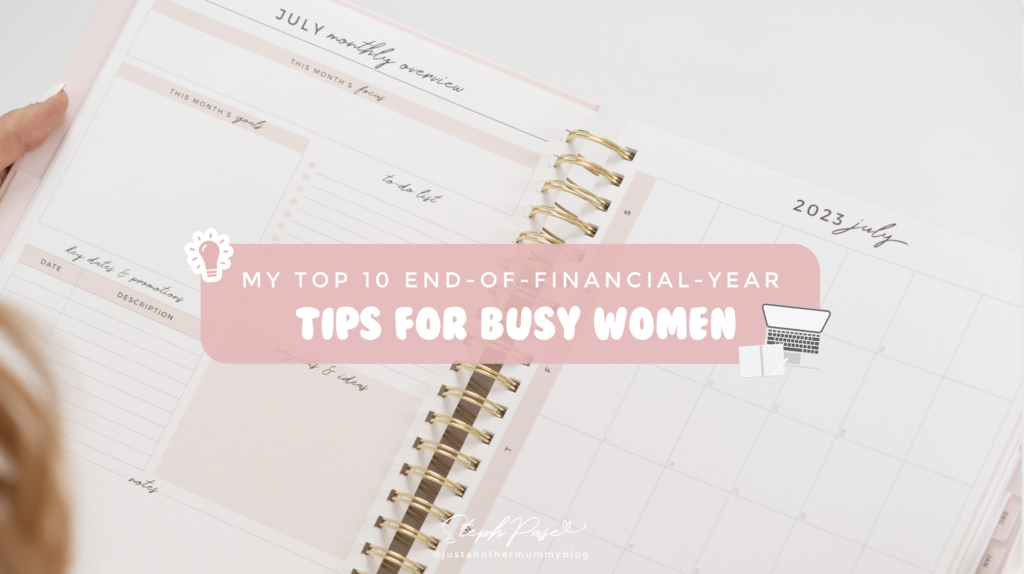This is the last part of my four-part holiday series, thank you for joining…

The end of the financial year is here, so it’s time to get our financial ducks in a row for tax time and the new FY23–24. It’s not only businesswomen who need to keep on top of this stuff; in our current cost-of-living crisis, it’s crucial that every woman takes her finances seriously and does everything she can to be in the best financial shape possible for the next 12 months.
Here are my top EOFY tips (and please bear in mind, these are general only and do not constitute professional financial and legal advice):
- Gather Your Financial Arsenal:
First things first, gather all your financial documents in one place. Dig out those payment summaries, bank statements, receipts, and any other evidence of income and expenses. Being organised from the get-go will save you time and stress.
I highly recommend using a planner to track all your expenses, schedules, etc, for the entire year, so it’s already in one place come tax time. And if you have your own business, I created the 2023/24 Financial Year Business Planner especially for you!
- Powers of Deduction:
Make sure you don’t leave any eligible deductions on the table. Think about work-related expenses, self-education costs, charitable donations, and even home office expenses if you work from home. Just remember to keep those receipts and supporting documents handy.
I highly recommend setting up a folder in your email or on your computer to keep digital receipts and statements, and taking photos of physical receipts and/or storing them in a dedicated sleeve (my Signature Planner has its own receipts sleeve). There are also apps that help with this.
- Supercharge Your Super:
Consider making extra contributions to your super fund before June 30. Not only will it potentially reduce your taxable income, but it also means more money for retirement. Your future self will thank you!
- Health Insurance and the Medicare Levy Surcharge:
If you earn above a specific income threshold, having private health insurance can help you avoid the Medicare Levy Surcharge. It’s worth reviewing your health insurance coverage to ensure you’re not caught out. Take the time to compare policies and find one that suits your needs and budget.
- Government Benefits and Tax Offsets:
Ensure you are taking advantage of any government benefits, tax offsets, rebates and concessions you may qualify for, as these can significantly reduce household financial pressure. Check your eligibility for Family Tax Benefit Type A and B, Child Care Subsidy, Parenting Payment, Rent Assistance, Single Income Family Supplement and many more at Services Australia, and don’t forget there are a range of rebates and concessions available through state governments too — visit your state government website for more info.
- Sale Time:
So many businesses run EOFY sales at this time of year (including SPP!). If there’s something you need for work (uniforms, equipment, education materials), get it now on sale to include in your deductions.
- Shop Around:
Are you paying more than you need to for services like electricity, phone, internet and gas? What about loan interest rates? Shop around to see if you can get a better deal, or just phone your provider and straight-up ask if they can give you a better deal before you take your business elsewhere. Cheeky, but often effective!
- Cut Back Where You Can:
Review your monthly expenditure to identify ways you can save money. It doesn’t have to mean cutting things out entirely, just being strategic. For example, rather than subscribing to all the streaming services, choose one at a time. Watch the things you’re interested in, then cancel it and move to another. You can always sign up again later. And don’t forget, most services have a free trial period.
- Reflect on Your Financial Goals and Set New Ones:
I’m a firm believer in reflecting on our goals, and this includes financial ones. Did you achieve your financial goals this past FY? Why or why not? Get really honest with yourself and identify what worked and what didn’t, and use that knowledge to inform your new FY goals. Make them realistic and achievable.
- Seek Financial Advice:
If numbers aren’t your thing, consider consulting a qualified accountant or financial adviser for advice tailored to your specific situation. You don’t know what you don’t know.

For weekly tips & freebies make sure you’re in my FB community and Steph Pase Planners Community!
- 24Shares



